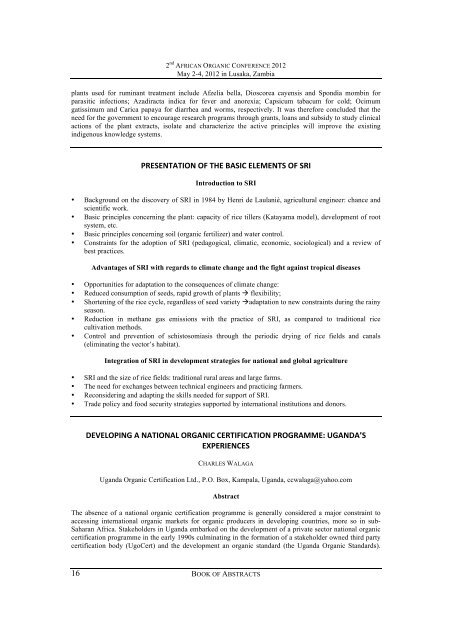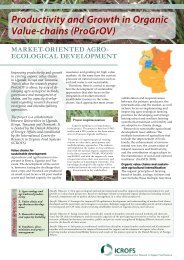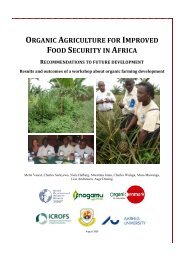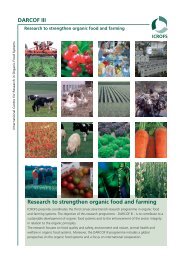The 2nd African Organic Conference â Mainstreaming ... - ICROFS
The 2nd African Organic Conference â Mainstreaming ... - ICROFS
The 2nd African Organic Conference â Mainstreaming ... - ICROFS
You also want an ePaper? Increase the reach of your titles
YUMPU automatically turns print PDFs into web optimized ePapers that Google loves.
2 nd AFRICAN ORGANIC CONFERENCE 2012<br />
May 2-4, 2012 in Lusaka, Zambia<br />
plants used for ruminant treatment include Afzelia bella, Dioscorea cayensis and Spondia mombin for<br />
parasitic infections; Azadiracta indica for fever and anorexia; Capsicum tabacum for cold; Ocimum<br />
gatissimum and Carica papaya for diarrhea and worms, respectively. It was therefore concluded that the<br />
need for the government to encourage research programs through grants, loans and subsidy to study clinical<br />
actions of the plant extracts, isolate and characterize the active principles will improve the existing<br />
indigenous knowledge systems.<br />
PRESENTATION&OF&THE&BASIC&ELEMENTS&OF&SRI&<br />
Introduction to SRI<br />
• Background on the discovery of SRI in 1984 by Henri de Laulanié, agricultural engineer: chance and<br />
scientific work.<br />
• Basic principles concerning the plant: capacity of rice tillers (Katayama model), development of root<br />
system, etc.<br />
• Basic principles concerning soil (organic fertilizer) and water control.<br />
• Constraints for the adoption of SRI (pedagogical, climatic, economic, sociological) and a review of<br />
best practices.<br />
Advantages of SRI with regards to climate change and the fight against tropical diseases<br />
• Opportunities for adaptation to the consequences of climate change:<br />
• Reduced consumption of seeds, rapid growth of plants ! flexibility;<br />
• Shortening of the rice cycle, regardless of seed variety !adaptation to new constraints during the rainy<br />
season.<br />
• Reduction in methane gas emissions with the practice of SRI, as compared to traditional rice<br />
cultivation methods.<br />
• Control and prevention of schistosomiasis through the periodic drying of rice fields and canals<br />
(eliminating the vector’s habitat).<br />
Integration of SRI in development strategies for national and global agriculture<br />
• SRI and the size of rice fields: traditional rural areas and large farms.<br />
• <strong>The</strong> need for exchanges between technical engineers and practicing farmers.<br />
• Reconsidering and adapting the skills needed for support of SRI.<br />
• Trade policy and food security strategies supported by international institutions and donors.<br />
DEVELOPING&A&NATIONAL&ORGANIC&CERTIFICATION&PROGRAMME:&UGANDA’S&<br />
EXPERIENCES&<br />
CHARLES WALAGA<br />
Uganda <strong>Organic</strong> Certification Ltd., P.O. Box, Kampala, Uganda, ccwalaga@yahoo.com<br />
Abstract<br />
<strong>The</strong> absence of a national organic certification programme is generally considered a major constraint to<br />
accessing international organic markets for organic producers in developing countries, more so in sub-<br />
Saharan Africa. Stakeholders in Uganda embarked on the development of a private sector national organic<br />
certification programme in the early 1990s culminating in the formation of a stakeholder owned third party<br />
certification body (UgoCert) and the development an organic standard (the Uganda <strong>Organic</strong> Standards).<br />
16<br />
BOOK OF ABSTRACTS





